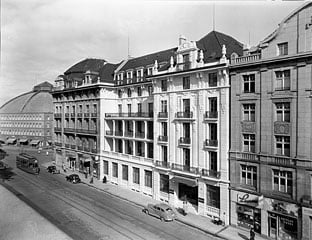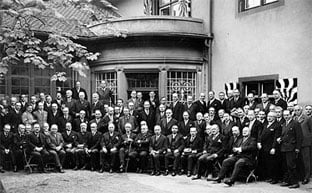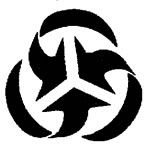In America, the people and their governmental representatives are ruled over by the banksters who own and control the
Federal Reserve system. In Australia, the people are slaves to their own central bank, the
Reserve Bank of Australia (RBA).
The Reserve Bank is not so much the government's bank, but the banking industry's bank. Despite the window dressing of public ownership, it runs its own policy independent of government. Australian politicians of whatever party, like most of their counterparts around the world, pride themselves on saying the Reserve Bank is independent of government. What they are really saying, is that despite whatever rhetoric about the Reserve Bank serving the people of Australia, it is not accountable to its supposed shareholders, the Australian people.
Government could print money or create the necessary credit through the Reserve Bank at no interest cost for worthwhile public works. Instead it goes cap in hand to the banks issuing IOUs by Treasury Notes, Commonwealth Bonds and other securities to borrow money created by the banks out of nothing at interest, for which the long suffering taxpayer has to pay.
US President Abraham Lincoln was acutely aware of this dilemma facing government. When seeking finance for the North during the US Civil war, Lincoln rejected the usury of the banks who were prepared to finance the North at 24% to 36% interest. Instead Lincoln began printing 'greenbacks' which the US currency design has followed ever since. As quoted in Appleton Cyclopaedia Lincoln was moved to remark, "I have two enemies; the Southern army in front of me and the financial institutions in the rear. Of the two the one in the rear is my greatest foe." He also noted that, "The government should create, issue and circulate all the currency and credit needed to satisfy the spending power of government and the buying power of consumers. The privilege of creating and issuing money is not only the supreme prerogative of government, but it is the government's greatest creative opportunity."
The governments of both nations
could take back their power and prosperity by implementing this policy, but instead they will allow the Rothschilds and their internationalist brethren to move into their endgame - a privately owned
global central bank.
The Tower of Basel: Secretive Plans for the Issuing of a Global CurrencyBy Ellen BrownIn an April 7 article in The London Telegraph titled “The G20 Moves the World a Step Closer to a Global Currency,” Ambrose Evans-Pritchard wrote:
“A single clause in Point 19 of the communiqué issued by the G20 leaders amounts to revolution in the global financial order.
“We have agreed to support a general SDR allocation which will inject $250bn (£170bn) into the world economy and increase global liquidity,’ it said. SDRs are Special Drawing Rights, a synthetic paper currency issued by the International Monetary Fund that has lain dormant for half a century.
“In effect, the G20 leaders have activated the IMF’s power to create money and begin global ‘quantitative easing’. In doing so, they are putting a de facto world currency into play. It is outside the control of any sovereign body. Conspiracy theorists will love it.”
Indeed they will. The article is subtitled, “The world is a step closer to a global currency, backed by a global central bank, running monetary policy for all humanity.” Which naturally raises the question, who or what will serve as this global central bank, cloaked with the power to issue the global currency and police monetary policy for all humanity? When the world’s central bankers met in Washington last September, they discussed what body might be in a position to serve in that awesome and fearful role. A former governor of the Bank of England stated:
“[T]he answer might already be staring us in the face, in the form of the Bank for International Settlements (BIS).... The IMF tends to couch its warnings about economic problems in very diplomatic language, but the BIS is more independent and much better placed to deal with this if it is given the power to do so.”1
And if that vision doesn’t alarm conspiracy theorists, it should. The BIS has been called “the most exclusive, secretive, and powerful supranational club in the world.” Founded in Basel, Switzerland, in 1930, it has been scandal-ridden from its beginnings. According to Charles Higham in his book Trading with the Enemy, by the late 1930s the BIS had assumed an openly pro-Nazi bias. This was corroborated years later in a BBC Timewatch film titled “Banking with Hitler,” broadcast in 1998.2 In 1944, the American government backed a resolution at the Bretton-Woods Conference calling for the liquidation of the BIS, following Czech accusations that it was laundering gold stolen by the Nazis from occupied Europe; but the central bankers succeeded in quietly snuffing out the American resolution.3

Modest beginnings, BIS Office, Hotel Savoy-Univers, Basel

First Annual General Meeting, 1931In Tragedy and Hope: A History of the World in Our Time (1966), Dr. Carroll Quigley revealed the key role played in global finance by the BIS behind the scenes. Dr. Quigley was Professor of History at Georgetown University, where he was President Bill Clinton’s mentor. He was also an insider, groomed by the powerful clique he called “the international bankers.” His credibility is heightened by the fact that he actually espoused their goals. He wrote:
“I know of the operations of this network because I have studied it for twenty years and was permitted for two years, in the early 1960's, to examine its papers and secret records. I have no aversion to it or to most of its aims and have, for much of my life, been close to it and to many of its instruments. ... [I]n general my chief difference of opinion is that it wishes to remain unknown, and I believe its role in history is significant enough to be known.”
Quigley wrote of this international banking network:
“[T]he powers of financial capitalism had another far-reaching aim, nothing less than to create a world system of financial control in private hands able to dominate the political system of each country and the economy of the world as a whole. This system was to be controlled in a feudalist fashion by the central banks of the world acting in concert, by secret agreements arrived at in frequent private meetings and conferences. The apex of the system was to be the Bank for International Settlements in Basel, Switzerland, a private bank owned and controlled by the world’s central banks which were themselves private corporations.”
The key to their success, said Quigley, was that
the international bankers would control and manipulate the money system of a nation while letting it appear to be controlled by the government. The statement echoed an often-quoted one made by the German patriarch of what would become the most powerful banking dynasty in the world. Mayer Amschel Bauer Rothschild famously said in 1791:
“Allow me to issue and control a nation’s currency, and I care not who makes its laws.”
Mayer’s five sons were sent to the major capitals of Europe – London, Paris, Vienna, Berlin and Naples – with the mission of establishing a banking system that would be outside government control. The economic and political systems of nations would be controlled not by citizens but by bankers, for the benefit of bankers. Eventually, a privately-owned “central bank” was established in nearly every country; and this central banking system has now gained control over the economies of the world. Central banks have the authority to print money in their respective countries, and it is from these banks that governments must borrow money to pay their debts and fund their operations.
The result is a global economy in which not only industry but government itself runs on “credit” (or debt) created by a banking monopoly headed by a network of private central banks; and at the top of this network is the BIS, the “central bank of central banks” in Basel.Continue
here.
Labels: BIS, RBA, The Fed






